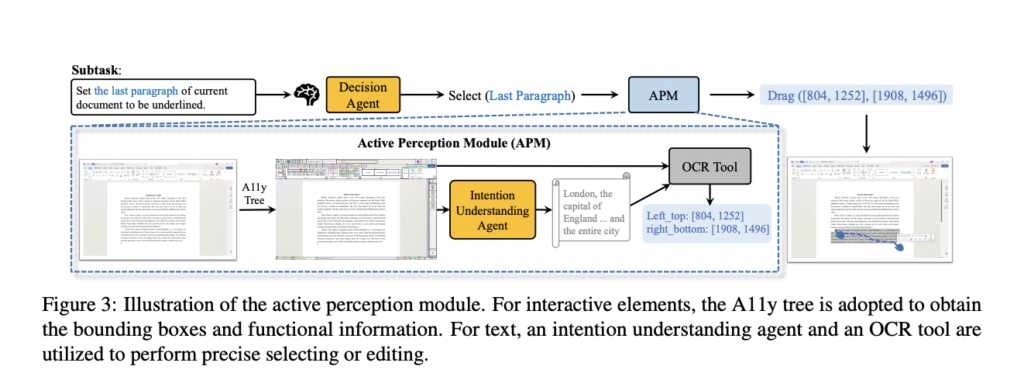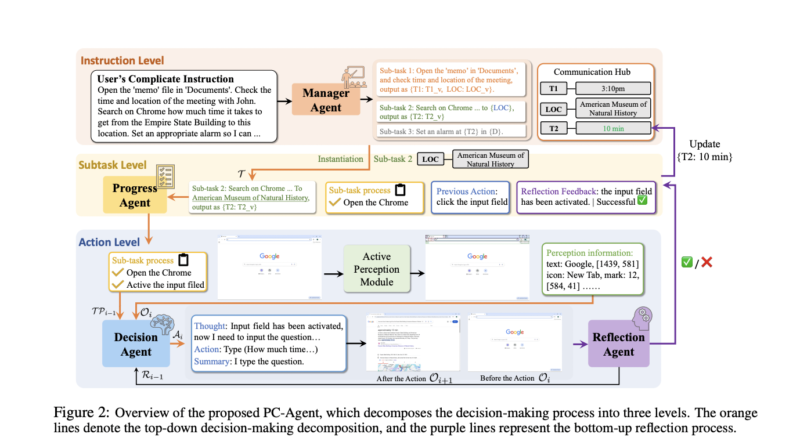PC-Agent: A Hierarchical Multi-Agent Collaboration Framework for Automating Complex PC Tasks
Artificial intelligence has made significant progress in automating tasks across various domains. However, PC-based automation presents unique challenges due to the complexity of graphical user interfaces (GUIs), multi-application workflows, and interdependent tasks. Unlike structured mobile environments, where interfaces follow standardized design principles, PC applications exhibit highly dynamic layouts, diverse interaction patterns, and complex dependencies between tasks.
Traditional automation techniques and single-agent AI systems struggle with GUI perception, managing lengthy instruction sequences, and handling cross-application dependencies. To address these limitations, researchers have introduced PC-Agent, a hierarchical multi-agent collaboration framework designed to enhance PC task automation by integrating multi-modal large language models (MLLMs), structured task decomposition, and reflection-based decision-making mechanisms.
Challenges in Automating PC-Based Tasks
Existing AI-driven automation faces several obstacles when applied to PC environments:
- Complex GUI Elements – PC applications feature dense, unlabeled, and highly variable graphical elements that make interaction difficult. Current AI models struggle to accurately recognize and interact with these elements.
- Multi-Application Workflows – Productivity tasks frequently require switching between multiple applications (e.g., extracting data from spreadsheets, generating reports, or automating email responses), introducing workflow dependencies that AI models fail to track effectively.
- Long Instruction Chains – Tasks in PC environments involve long sequences of actions where each step depends on the successful completion of previous subtasks. AI models often fail to maintain task continuity, resulting in partial or incorrect executions.
- Low Success Rates in Complex Tasks – Even advanced AI models such as GPT-4o, Claude 3.5, and Gemini 2.0 exhibit poor success rates (8-12%) in full-length PC automation tasks. Single-agent AI approaches are insufficient for managing intricate workflows.
PC-Agent: A Multi-Agent Framework for Intelligent Task Automation

PC-Agent introduces a structured multi-agent collaboration framework to overcome the limitations of single-agent automation. It incorporates three core innovations:
1. Active Perception Module: Enhancing GUI Interaction
- Fine-Grained Perception – Extracts interactive elements and their contextual meanings using accessibility trees and Optical Character Recognition (OCR).
- MLLM-Driven Intention Recognition – Uses multi-modal language models to analyze GUI structures and infer user intent.
- Dynamic UI Adaptation – Ensures the model can interact with dynamically changing interface layouts across different applications.
2. Hierarchical Multi-Agent Collaboration: Structured Decision-Making
PC-Agent employs a three-tier decision-making structure to efficiently decompose tasks, track progress, and execute actions:
- Manager Agent – Decomposes high-level user instructions into structured subtasks, ensuring logical sequencing.
- Progress Agent – Monitors task execution history to maintain workflow integrity and prevent redundant actions.
- Decision Agent – Executes the required actions by interacting with GUI elements using the Active Perception Module.
3. Reflection-Based Dynamic Decision-Making: Real-Time Error Handling
- Reflection Agent – Evaluates execution accuracy, detects failures in real-time, and provides corrective feedback to refine the process.
- Adaptive Task Correction – If an action produces unexpected results, the Reflection Agent adjusts execution strategies dynamically, improving reliability.
Performance Evaluation: PC-Agent vs. Existing Methods
PC-Agent was evaluated on PC-Eval, a benchmark designed to assess real-world PC automation tasks.
Key Benchmark Results
- PC-Agent achieved a 44% higher success rate than UFO (a prior multi-agent framework) and 32% better than AgentS in automating full-length PC workflows.
- Single-agent models (GPT-4o, Claude 3.5, Gemini 2.0) achieved only 12% task completion rates, reinforcing the need for multi-agent collaboration.
- PC-Agent outperformed traditional approaches in GUI-heavy tasks, such as document editing, spreadsheet automation, and software navigation, where perception accuracy and workflow tracking are essential.
Implications for AI-Driven Automation
PC-Agent represents a significant advancement in AI-powered task automation by addressing long-standing challenges in GUI interaction, workflow management, and decision accuracy. The framework introduces a structured approach to breaking down complex tasks into manageable components, making it a highly effective solution for automating PC-based workflows.

Key Advantages
- Improves AI efficiency – By structuring decision-making, PC-Agent minimizes errors and enhances automation reliability.
- Handles complex workflows – Unlike traditional automation, PC-Agent manages multi-application tasks and long instruction chains.
- Enhances real-world applicability – PC-Agent is particularly useful in enterprise-level automation, benefiting industries such as finance, legal, and data processing.
Conclusion
PC-Agent establishes a new benchmark for PC-based AI automation by leveraging multi-agent collaboration and dynamic reflection mechanisms. Unlike previous approaches, it integrates perception, task management, and adaptive decision-making into a single cohesive framework.
With superior performance in complex task execution, higher success rates in GUI-based automation, and advanced real-time error correction, PC-Agent represents a transformative step toward more intelligent and efficient PC automation.
As AI-driven automation continues to evolve, frameworks like PC-Agent will play a crucial role in making complex PC tasks more accessible, reliable, and efficient.
Check out the Paper & GitHub Page. All credit for this research goes to the researchers of this project.
Do you have an incredible AI tool or app? Let’s make it shine! Contact us now to get featured and reach a wider audience.
Explore 3800+ latest AI tools at AI Toolhouse 🚀. Don’t forget to follow us on LinkedIn. Do join our active AI community on Discord.
Read our other blogs on LLMs 😁
If you like our work, you will love our Newsletter 📰






